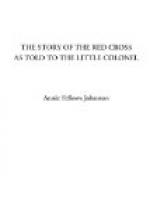It was from a sad-faced lady in black, who had had two sons drowned in the Johnstown flood, that Lloyd heard the description of Clara Barton’s five months’ labor there. A doctor’s wife who had been in the Mt. Vernon cyclone, and a newspaper man who had visited the South Carolina islands after the tidal wave, and Charleston after the earthquake, piled up their accounts of those scenes of suffering, some of them even greater than the horrors of war, so that Lloyd dreamed of fires and floods that night. But the horror of the scenes was less, because a baby voice called cheerfully through them, “Here, daddy, give these to the poor little boys that are cold and homesick;” and a great St. Bernard, with a Red Cross on his back, ran around distributing mittens and tin soldiers.
CHAPTER V
IN AFTER YEARS
Time flies fast under the Locusts. The sixteen years which have passed since Hero followed his little mistress home have brought many changes. He is only a tender memory now. A square, white stone stands on the lawn where “taps” were sounded over him one September day, long ago. But the sight of it no longer brings pain to the Little Colonel. With the sweet ambition in her heart to make life happier for every one she touches, she has grown up into a veritable Princess Winsome.
In a home of her own now, to her own little son, she sometimes tells the story that is set down here. He is too young yet, to be told the chapters which have been added since to that amazing history of sacrifice and service. And she cannot say now as the old Major said then—“Wherever the Red Cross goes is safety for the wounded soldiers. No nurse, surgeon or ambulance bearing that sign can be fired upon.” That part is no longer true, although the day is coming soon when we shall make it true for all time.
She cannot tell him that the very nation which was first and foremost in training such dogs as Hero in service for mankind has violated its treaties and filled the world with horrors and suffering unspeakable. His trusting baby heart could not understand such treachery. But young as he is he knows what that red and white symbol means.
Because “daddy” wore one on his arm when he marched away with the other soldiers, he must have one on the sleeve of his little blue rompers. Because “deah muvva” wears one on the veil which binds her forehead, when she comes back from the unit where she has spent long hours away from him, he associates it with all that is loveliest to him—her lovely face, her arms that are his peace and comfort and safety, her lips that kiss away all his hurts and make them well.
Long before he is old enough to hear the terrible war-part of the story, War shall be at an end, please God, and the Red Cross shall mean to the nations left upon the earth what it means to him—arms that enfold a suffering humanity, lips that press a great mother-love to all its hurts and make them well.




